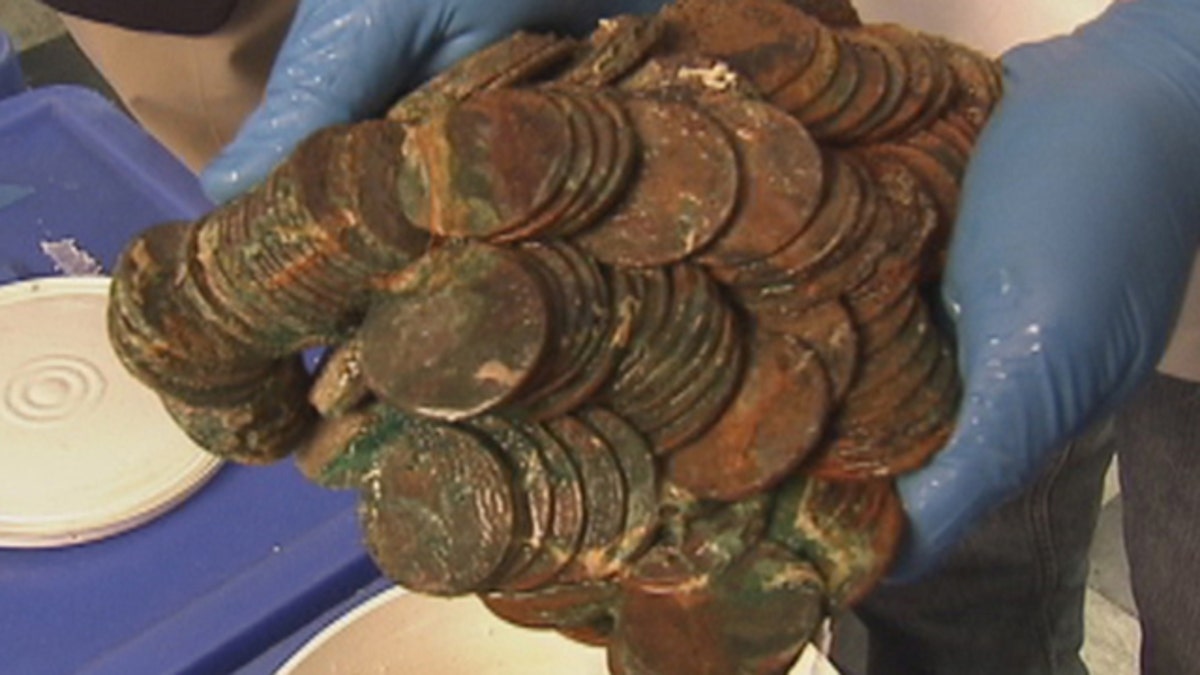
Florida deep sea explorers found the sunken treasure but, unfortunately for them, that wasn't the hardest part.
The explorers asked the court Tuesday to overturn an earlier ruling that 17 tons of treasure recovered from a sunken Spanish galleon belongs to Spain, deepening a long-running battle over a trove worth at least $500 million that has unfolded not on the high seas but in federal courtrooms.
Attorneys for Odyssey Marine Exploration asked the three-judge panel of the 11th Circuit Court of Appeals to uphold the "finders keepers" rule that would give the treasure hunters the rights to silver coins, copper ingots, gold cufflinks and other artifacts salvaged about four years ago from the galleon off the coast of Portugal. Spain's lawyers countered that U.S. courts are obligated by international treaty and maritime law to uphold Spain's claim to the haul.
The ship, called the Nuestra Senora de las Mercedes, was sunk by British warships in the Atlantic in 1804 while sailing back from South America with more than 200 people on board. Odyssey created an international splash in May 2007 when it announced that it raised more than 500,000 silver coins and other artifacts from the wreck and flew the treasure back to Tampa.
Spain went to the U.S. District Court in Tampa, where the company is based, claiming ownership while Odyssey disputed the Spanish government's ownership of the valuable cargo.
A federal judge sided with Spain in the first round of the tug-of-war in June 2009, accepting the Spanish government's argument that it never surrendered ownership of the ship and its contents. But the two sides -- along with a horde of other lawyers representing outside parties -- were back in court Tuesday to argue a case that could spill over to treasure hunts for years to come.
Much of Tuesday's arguments centered on whether the Mercedes was classified as a warship or merchant ship. That's an important distinction because Odyssey's attorneys argued that if the vessel was destroyed during commercial activity, Spain would have no firm claim to the property. International treaties generally hold that warships sunk in battle are protected from treasure seekers.
"There is no vessel. There is no ship. There is no graveyard," said Odyssey attorney Melinda MacConnel, who added that the company never raised any remnants of the actual ship. "The commercial activity of this ship could not be more clear."
Judges from the three-judge panel pressed MacConnel on why explorers also recovered ammunition, firearm remnants and about 18 cannons from the wreckage if the ship wasn't designed for war. But she said the Spanish government wouldn't have allowed the ship to make the trans-Atlantic journey if it was during a time of war.
"It set sail during a time of neutrality," she said. "Her gun decks were clogged with private merchants' cargo. She would not have even been able to fight."
Spain's attorney, James Goold, argued that U.S. courts have no right to intervene in the argument in the first place. He urged the court to dismiss Odyssey's appeal and allow Spain's judges to settle the arguments. He said a warship and its crew resting at the bottom of the ocean form "a sacred site" that is protected from treasure hunters by international law.
"These are matters in which the U.S. court has no business," Goold added.
Odyssey's relations with Spain have been testy since the tussle. Some in the Spanish government have called the publicly traded company's employees 21st century pirates, and twice in the months after the 2007 announcement, ships from Spain's Civil Guard seized Odyssey ships off the Spanish coast. Both ships and their crews were released within a week.
An official with the Spanish Culture Ministry declined to comment until a ruling is issued. The three-judge panel did not immediately issue its decision, which could take months.
But any decision the court makes is complicated by several outside interests that have also petitioned the court.
About two dozen descendants of merchants who were transporting cargo on the ship want a stake. Peru also filed a claim for a piece of the fortune, arguing that nation was part of the Spanish empire when the ship sunk and the recovered coins were likely minted in Lima. Ships often treaded the dangerous waters between Europe and New World colonies trading money for crops and other valuables.
Justice Department attorneys, who also weighed in, said the court can and must direct that the loot be returned to Spain. Attorney Sharon Swingle said any decision the court makes could come back to haunt the U.S., which has more than 3,000 sunken warships and hundreds more downed fighter planes scattered across the bottom of the world's oceans.
"If we don't afford to Spain the protections of sunken warships, then we can't ask them for the same protections," Swingle said.
But Circuit Judge Frank Hull cautioned that the case shouldn't be made overly complicated.
"The reality is," Hull said, "this case is about money."
For more stories from WTVT in Tampa Bay, Florida go to myfoxtampabay.com.
The Associated Press contributed to this report.
Follow us on twitter.com/foxnewslatino
Like us at facebook.com/foxnewslatino








































